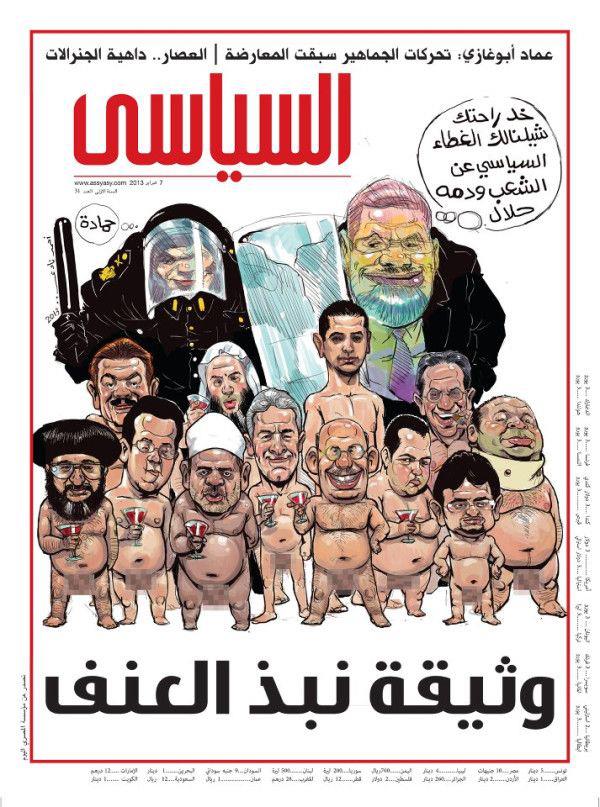From the Arab West Report’s newsletter, by its editor Cornelis Hulsman, a veteran advocate of better Muslim-Christian relations in Egypt who has extensive contacts on both sides:
The Kerdassa police station (Giza) has been attacked using an RPG after elsewhere in the city sit-ins of demonstrators were broken up. This resulted in the death of the local police chief and several police officers whose bodies have then be mutilated. Twenty other police stations were attacked, often with weapons that they were not prepared for. Demonstrators who claimed to be with the Muslim Brotherhood threw a police car with 5 policemen from a bridge killing all of them. Those images are spread all over and have created a shock-wave. It is thus no wonder that policemen seek safer locations to operate from. It also makes the mutual hate between police and Muslim Brothers and militant groups much deeper. The mutual hate is many decades old. Between 1992 and 1997 militant Muslims engaged in attacks on police and civilians. Militant Muslims and political Islamists were targeted by police, many of them ended up for years in prison, also if they had no involvement with any violence. The police did not have a good reputation. Officers were often accused of torture. It is thus no wonder that the police are most hated by Islamists and now, just as on January 28, 2011 and following weeks, are targeted.
The patterns of systematic attack on Egyptian security resemble those of January 28, 2011. People have again come from villages and popular areas to massively destroy government property. But unlike 2011, people now also targeted churches and Christian shops. AWR called priests, friends of ours, in Beni Suef, Fayoum, Maghagha, and Minya. The police have disappeared from all these cities and other cities because they became targets themselves and fled. That is no wonder if one sees on videos how policemen have been brutally slaughtered in Cairo and other parts of Egypt. The consequence is that the police are withdrawing to centers where they feel safe and can defend themselves better. The consequence, however, is that thugs have had more opportunities to engage in violence and destruction. The police in Assiut disappeared on the 14th from the street, but returned again on the 15th.
Violence is widespread, but AWR has also spoken with priests who told us that there had been no violence in their village or town. Much of this also, but not only, depends on local relations. Fear is widespread in all parts of Egypt. If particular areas have not yet been targeted they later may or may not become targets.
It all appears that General al-Sisi has made a miscalculation when he, in cooperation with other authorities, decided to end the demonstrations around the Rābaʽah al-‘Adawīyyah mosque and al-Nahda square. Protesters spread and throughout the country militant groups are seen. It is obvious that these groups are organized. It is not possible to explain how otherwise they suddenly appear all over Egypt. AWR has asked friends in various cities to explain why they believe that these were Muslim Brothers. Some friends said that the people marching with weapons in the streets scream, “Islamiya, Islamiya.” Many of them are young. They were surprised to see also small children among them. Priests we spoke to said they believed them to be a mix of Brothers joined by many thugs, people seeing an opportunity to loot.
Emad Aouni lives in Assiut and has seen Muslim Brothers he knows from the sit-in in Assiut participating in attacking churches. They were, however, not alone but in the company of members of the Jamā’ah al-Islāmīyah, Salafīs, and thugs. “They usually would not do this alone but in a group with other Islamists they would go along.”
AWR’s website has been hacked, so the full piece is not up there. I am pasting it here for those who are curious – it also includes a full list of churches that have come under attack.

